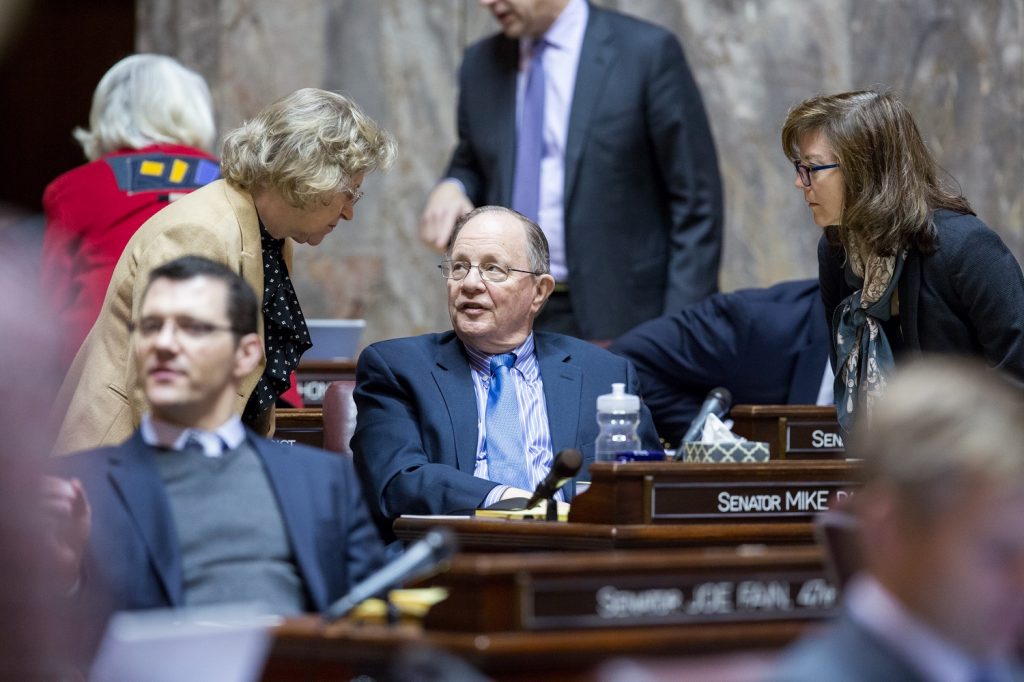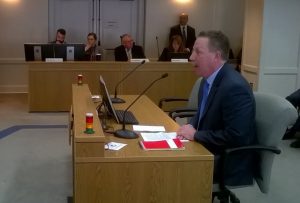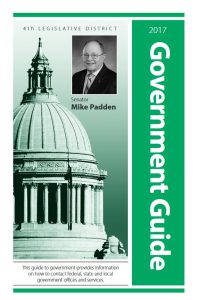The following newsletter was sent to subscribers to Sen. Padden’s newsletter, May 3, 2017. To subscribe to Sen. Padden’s newsletters, click here.

Conferring on the Senate floor with Sens. Barbara Bailey, R-Oak Harbor (left), and Sharon Brown, R-Kennewick.
Dear friends and neighbors,
The first important action of our special session took place Tuesday as the full House and Senate convened and started taking action on some of the most important issues that remain before us. For the second time, we passed numerous bills that did not receive votes in the House. These votes help demonstrate that in the Legislature, no bills are ever really dead when members consider them a priority. Our support for these measures also shows our determination to see them pass.
Among the measures kept alive for further consideration is our Department of Corrections reform bill, SB 5294. This legislation enacts the recommendations of the Senate Law and Justice Committee following our investigation last year of the early release of some 3,000 violent and dangerous felons. The bill enacts a number of reforms aimed at ensuring Corrections responds to emerging public concerns, and that the agency understands its primary duty is public safety. This bill originally passed the Senate March 6, but it did not receive a vote on the House floor before our regular session ended April 23.
Also passing the Senate Tuesday was our “Hirst fix” bill. I am a co-sponsor of SB 5239, which would overturn a Supreme Court decision last fall that imposes difficult obstacles on any rural property owner who needs to drill a new household-size well. This measure was blocked in the House, yet it has strong bipartisan support. We are signaling that we intend to see this matter through, by insisting that Hirst must be addressed before we negotiate a final agreement on the capital budget.
This is the point when important issues like these begin to figure in our session-ending negotiations. We are raising the stakes, as we should.
Sen. Mike Padden
New leadership for the Department of Corrections

Steve Sinclair testifies before the Senate Law and Justice Committee at his confirmation hearing Tuesday.
Last week, Gov. Jay Inslee appointed a permanent secretary for the Department of Corrections, Steve Sinclair – a step that may help end the management turmoil in that troubled department. Sinclair is the fourth leader for Corrections since Bernie Warner resigned a year and a half ago, shortly before revelations of mismanagement raised serious concerns about the agency’s direction.
Sinclair, formerly the assistant secretary in charge of prisons, once served as superintendent of the state penitentiary in Walla Walla. He appeared before the Senate Law and Justice Committee this week for his confirmation hearing. Sinclair comes to us with high recommendations and he demonstrates a potential for strong leadership, so important for this agency that has been left somewhat adrift since 2015.
Capital budget negotiations hinge on Hirst
Not only did the Senate pass the Hirst bill for a second time, we are making it clear that inaction is unacceptable. Over the last week, Sen. Jim Honeyford, R-Sunnyside, the Senate lead on the capital budget, has stated repeatedly that negotiations on a final agreement will not begin until the House takes action to resolve this issue. Honeyford told the Columbia Basin Herald last week, “I’m just saying, before we can negotiate a capital budget… we need a Hirst fix first.”
The capital budget funds local public-works projects across the state, and both chambers have much at stake. Meanwhile, thousands of rural property owners who scrimped and saved to buy their land are being held hostage by the refusal of the House to deal with the well-water issue. Their right to develop their property is at risk. By insisting on a Hirst solution before final negotiations begin, the Senate demonstrates the importance we attach to private-property rights.
Immigration issue continues to simmer
Three weeks ago I sent a letter of protest to Attorney General Bob Ferguson about new ‘guidance’ that could be seen as an instruction manual to state and local agencies on ways they can impede federal efforts to enforce immigration laws. This 101-page guidance document is likely to be seen by law enforcement agencies as a directive – yet it demonstrates disrespect for the laws they are sworn to uphold. If they follow the guidance, they could lose federal funding.
Since we made this letter public last week, appearances on talk radio programs have underscored my concern with this misguided policy. For years federal enforcement of immigration laws has been lax. Merely enforcing the laws we already have should not be a matter of controversy. A good description of the issue appeared last week in the Spokesman-Review.
We also filed a Public Records Act request for all documents related to the guidance. Curiously, Ferguson’s office did not respond with an estimate of when the records will be produced, as required by law. Instead, it responded with an estimate of when it might produce an estimate. We are still waiting for a response from the state’s top legal officer, both to our records request and the greater issue raised by his position.
Where do you stand on immigration?
This week’s survey question concerns federal efforts to enforce immigration law, and the issues raised by non-cooperation. To participate in the survey, click the question below.
Government guides available at Valley district office
 Our district office opened for business this week at Spokane Valley City Hall, 11707 East Sprague Avenue, Suite 305. We are distributing copies of our new Government Guide, which provides phone numbers and addresses for local, state and federal agencies and officials. If you have not gotten a copy in the mail, let us know and we will send you one. Our phone number is (509) 921-2460. This guide also is available online here.
Our district office opened for business this week at Spokane Valley City Hall, 11707 East Sprague Avenue, Suite 305. We are distributing copies of our new Government Guide, which provides phone numbers and addresses for local, state and federal agencies and officials. If you have not gotten a copy in the mail, let us know and we will send you one. Our phone number is (509) 921-2460. This guide also is available online here.












